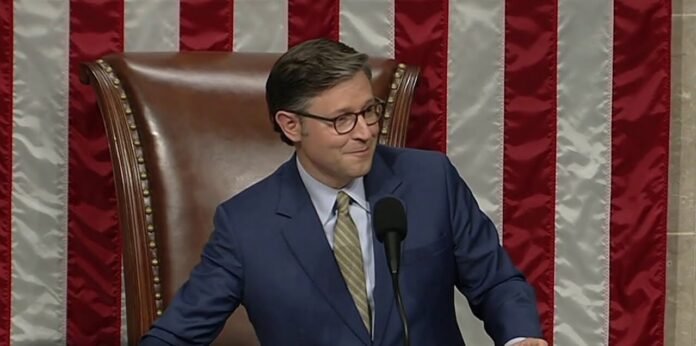House approves Trump’s massive tax cuts and medicaid rollbacks, risking millions losing vital aid
In a razor-thin vote, the House of Representatives passed the sweeping Trump tax bill that enacts Donald Trump’s tax and spending agenda, while risking millions of Americans’ access to essential healthcare and food benefits. The legislation, known as the One Big Beautiful Bill Act, passed with 215 votes in favor and 214 against, largely divided along party lines.
The bill promises to extend tax cuts for individuals and corporations and repeals clean energy incentives introduced under Joe Biden. It relieves taxes on tips, overtime pay, and car loan interest, and offers parents $1,000 for opening “Trump accounts” for their children. Additionally, it expands tax deductions for older taxpayers — but only while Trump remains in office.
Significantly, the bill allocates funding to build a border wall along the U.S.-Mexico frontier and boosts resources for mass deportations of undocumented immigrants. However, to offset the enormous cost — estimated at $3.8 trillion — Republicans have slashed funding and introduced strict work requirements for Medicaid and the Supplemental Nutrition Assistance Program (SNAP), the federal food aid programme. Experts warn these measures could bar millions of vulnerable Americans from receiving healthcare and food support.
The Congressional Budget Office projects the bill will add about $2.3 trillion to the already ballooning US deficit. This comes just days after Moody’s downgraded the US credit rating, citing the country’s massive debt as a grave concern.
House Speaker Mike Johnson celebrated the bill’s passage, declaring, “It’s finally morning in America again.” He credited Republicans with overcoming doubt and delivering on Trump’s “America first” agenda despite their slim majority.
Donald Trump enthusiastically hailed the vote on his Truth Social platform, calling it “arguably the most significant piece of Legislation that will ever be signed in the History of our Country!” He urged the Senate to act swiftly and send the bill to his desk “AS SOON AS POSSIBLE!”
Democrats swiftly condemned the legislation. House Minority Leader Hakeem Jeffries called it a “tax scam” that Republicans pushed “in the dead of night” because it is deeply unpopular. Democratic leaders vowed to continue fighting the bill in the Senate and beyond.
Former President Barack Obama joined the chorus of criticism, warning the bill would put millions at risk of losing healthcare by cutting Medicaid funding and tax credits that help working families. He encouraged the public to pressure their senators to oppose the measure.
The bill’s passage exposed sharp divides even within the Republican Party. Speaker Johnson had to negotiate concessions to appease moderates from Democratic-led states who demanded larger state and local tax (SALT) deductions. He also faced resistance from fiscal conservatives concerned about the soaring deficit. Kentucky’s Thomas Massie and Ohio’s Warren Davidson stood as the only Republican dissenters, condemning the bill as a “debt bomb ticking.”
With the bill now headed to the Senate, Senate Majority Leader Chuck Schumer promised fierce opposition. He argued the legislation’s tax cuts overwhelmingly benefit the wealthy while threatening millions of Americans’ health and nutrition. Schumer predicted the bill would deepen divisions among Senate Republicans and boost Democrats’ chances in upcoming elections.
Republicans, however, hope to pass the bill before Independence Day and deliver a signature legislative victory for Trump. If signed into law, the bill would mark a dramatic reshaping of US fiscal policy, prioritising tax cuts and immigration enforcement at the expense of social safety nets.
As millions face the prospect of losing critical aid, and the national debt climbs ever higher, the nation stands at a crossroads. The bill’s passage signals a stark choice between Trump’s vision of economic “rebirth” and growing fears of widening inequality, financial instability, and social hardship.
